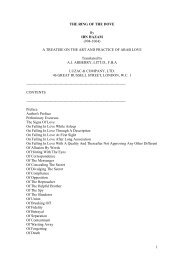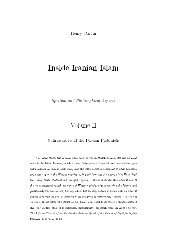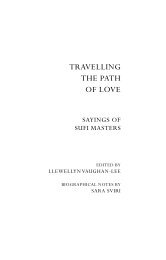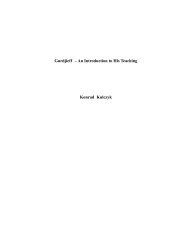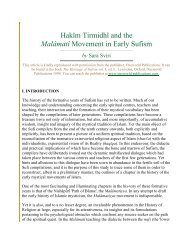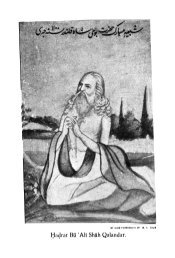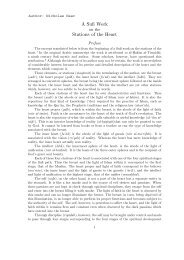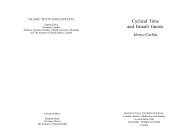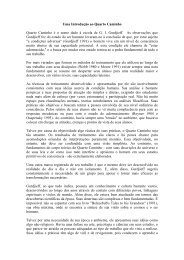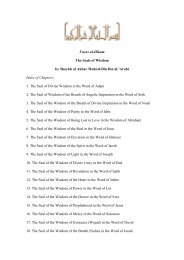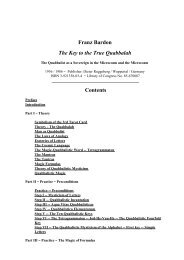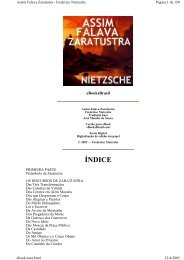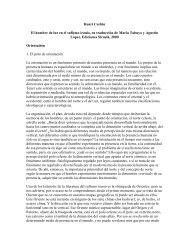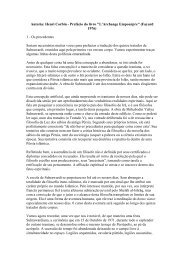Temple and Contemplation brings together for the first ... - ImagoMundi
Temple and Contemplation brings together for the first ... - ImagoMundi
Temple and Contemplation brings together for the first ... - ImagoMundi
Create successful ePaper yourself
Turn your PDF publications into a flip-book with our unique Google optimized e-Paper software.
THE IMAGO TEMPLI IN CONFRONTATION<br />
Community to experience <strong>the</strong> jam <strong>and</strong> <strong>the</strong> nondum with <strong>the</strong> difference<br />
between <strong>the</strong>m abolished <strong>and</strong> <strong>the</strong> abyss between <strong>the</strong>m filled in. This is so<br />
because <strong>the</strong> Community experiences itself as <strong>the</strong> intermediary place uniting<br />
God's celestial habitation with his earthly habitation: <strong>the</strong> <strong>Temple</strong> of <strong>the</strong><br />
kingdom, "<strong>the</strong> unique sanctuary where, in an intimately synchronized<br />
liturgy, <strong>the</strong> worship of men <strong>and</strong> <strong>the</strong> worship of Angels conjoin". 156 Needless<br />
to say, <strong>the</strong> symbolism of <strong>the</strong> <strong>Temple</strong> is not <strong>the</strong> cause which enables <strong>the</strong><br />
Community to believe in <strong>the</strong> present realization of eschatological salvation.<br />
It is one of <strong>the</strong> modes—<strong>and</strong> an exalted mode at that—of envisaging <strong>the</strong><br />
presence of <strong>the</strong> final salvation. 157<br />
Once this realized eschatology is seen as essentially linked to <strong>the</strong> motif<br />
of Paradise <strong>and</strong> of <strong>the</strong> restoration of Adam, <strong>the</strong> Anthropos, to <strong>the</strong> state of<br />
Paradise, it has to be safeguarded by a conception of a time which is o<strong>the</strong>r<br />
than <strong>the</strong> time of History; <strong>for</strong> o<strong>the</strong>rwise <strong>the</strong> motif in question will be<br />
relegated to <strong>the</strong> imaginary, <strong>and</strong> will not be stabilized on <strong>the</strong> level of <strong>the</strong><br />
mundus imaginalis as a reality sui generis in its own right: <strong>the</strong> reality in which<br />
<strong>the</strong> events of hierohistory or "subtle" history take place. For all visionary<br />
events take place <strong>and</strong> have <strong>the</strong>ir place in <strong>the</strong> subtle time of this subtle<br />
history, whenever <strong>the</strong> invisible world, disclosing itself to <strong>the</strong> seer, sets him<br />
in <strong>the</strong> company of <strong>the</strong> Angels.<br />
This is what happens in <strong>the</strong> great visionary scene that takes up <strong>the</strong><br />
whole of chapter III of <strong>the</strong> Book of Zechariah. The high priest Joshua is<br />
defended from Satan by <strong>the</strong> Angel of Yahveh himself. The Angels remove<br />
his soiled clo<strong>the</strong>s <strong>and</strong> clo<strong>the</strong> him in festal garments (3:4). And <strong>the</strong> Angel of<br />
Yahveh utters <strong>the</strong> solemn promise in <strong>the</strong> name of <strong>the</strong> Lord of hosts:<br />
<strong>the</strong> <strong>Temple</strong> of Jerusalem, rebuilt <strong>and</strong> purified, will once more be filled<br />
with <strong>the</strong> divine Presence. It will once more be <strong>the</strong> place filled with <strong>the</strong><br />
company of Angels, because <strong>the</strong>re is no gap, no hiatus between <strong>the</strong><br />
celestial <strong>and</strong> <strong>the</strong> earthly <strong>Temple</strong>s. "Ecce enim adduco servum meum<br />
Orientem" (3:8). "Ecce vir, Oriens nomen ejus et subter eum orietur et<br />
156 A. Jaubert, op. cit., p. 191.<br />
157 D. E. Aune, op. cit., p. 37. But if one can say that what differentiates <strong>the</strong> concept of<br />
<strong>the</strong> eschaton as a restitutio principii, as professed at Qumran <strong>and</strong> in Jewish apocalyptic<br />
literature in general, in relation to o<strong>the</strong>r religions, is <strong>the</strong> conception of <strong>the</strong> <strong>the</strong>ophanic<br />
nature of history, it is still necessary to specify that this is not History in <strong>the</strong><br />
ordinary, current sense of <strong>the</strong> word, but a hierohistory; <strong>and</strong> <strong>the</strong> time of this<br />
hierohistory, in which <strong>the</strong> events proper to it take place, is no longer <strong>the</strong> time of<br />
profane history. The hierohistoric recital is by its essence a "hierology". Cf. below,<br />
note 170.<br />
326<br />
THE IMAGO TEMPLI IN CONFRONTATION<br />
aedificabit templum Domino" (6:12). 158 This promise is addressed by <strong>the</strong><br />
Angel to "Joshua <strong>the</strong> high priest, thou, <strong>and</strong> thy fellows that sit be<strong>for</strong>e<br />
<strong>the</strong>e" (3:8), who are described as "men who serve as signs or portents"<br />
(viri portendentes). This very same expression is used to describe <strong>the</strong> companions<br />
of <strong>the</strong> psalmist of Qumran. 159 There is a knowledge which man,<br />
through his communion with <strong>the</strong> Angels, is called upon to share. The<br />
Angels are <strong>the</strong> "knowers" par excellence. "You have charged man with an<br />
eternal destiny in <strong>the</strong> company of <strong>the</strong> Spirits of knowledge . . ." It is this<br />
that, a few lines above, made us keep <strong>the</strong> Latin of <strong>the</strong> Vulgate: Ecce vir,<br />
Oriens nomen ejus. The Angel's knowledge is knowledge of <strong>the</strong> Orient "in <strong>the</strong><br />
Orient" of things, knowledge which is "oriental" in <strong>the</strong> metaphysical sense<br />
of <strong>the</strong> word: <strong>the</strong> cognitio matutina, a term whose exact equivalent is <strong>the</strong> 'ilm<br />
ishraqi found in Suhravardi, who resurrected <strong>the</strong> ancient Persian <strong>the</strong>osophy<br />
of Light in Islamicized Iran. Oriens is <strong>the</strong> type of man realized by all<br />
<strong>the</strong> sons of Light.<br />
Naturally, <strong>the</strong> esoteric character of this knowledge or gnosis need not<br />
surprise us. It has long been known from <strong>the</strong> historian Josephus that <strong>the</strong><br />
Essenes pledged <strong>the</strong>mselves "not to reveal <strong>the</strong> names of <strong>the</strong> Angels", <strong>for</strong><br />
this is one of <strong>the</strong> mysteries about which <strong>the</strong> initiate does not speak lightly<br />
in front of anyone. But this does not mean that, on <strong>the</strong> level of Qumran<br />
angelology, it is not fitting to note, as Annie Jaubert does so well, <strong>the</strong><br />
expansive breath of cosmic communion which inspires <strong>the</strong> piety of <strong>the</strong><br />
faithful. The word ecclesia is taken here, of course, in its etymological sense,<br />
connoting <strong>the</strong> idea of a liturgical assembly. It would <strong>the</strong>re<strong>for</strong>e be simpler<br />
to say just "<strong>the</strong> <strong>Temple</strong>", since <strong>the</strong> union of <strong>the</strong> celestial <strong>and</strong> <strong>the</strong> terrestrial<br />
communities is, indeed, <strong>the</strong> <strong>Temple</strong>. Bearing this in mind, we can subscribe<br />
to <strong>the</strong> following lines: "On entering into <strong>the</strong> covenant of <strong>the</strong> Community,<br />
which was by definition <strong>the</strong> Covenant of God, <strong>the</strong> new member was<br />
involved in an immense ecclesia, both of Angels <strong>and</strong> of men, of which it<br />
could perhaps be said without paradox that it was more celestial than<br />
earthly. It was <strong>the</strong> communion of <strong>the</strong> sons of Light, of <strong>the</strong> sons of truth, of<br />
<strong>the</strong> "Saints", whe<strong>the</strong>r of heaven or of earth. Beyond was <strong>the</strong> world of<br />
darkness, where Belial <strong>and</strong> his troop of evil spirits exercised <strong>the</strong>ir perverse<br />
158 What <strong>the</strong> Vulgate translates as Oriens is often translated as "branch". We prefer<br />
<strong>the</strong> <strong>for</strong>mer, with its distant echoes of <strong>the</strong> concept of <strong>the</strong> Ishraq <strong>and</strong> <strong>the</strong> Ishraqiyun<br />
(<strong>the</strong> "Orientals") in Suhravardi ('ilm ishraqi, "oriental" knowledge, cognitio matutina).<br />
Cf. a-bove, note 89.<br />
159 Cf. A. Jaubert, op. cit., p. 190.<br />
327



